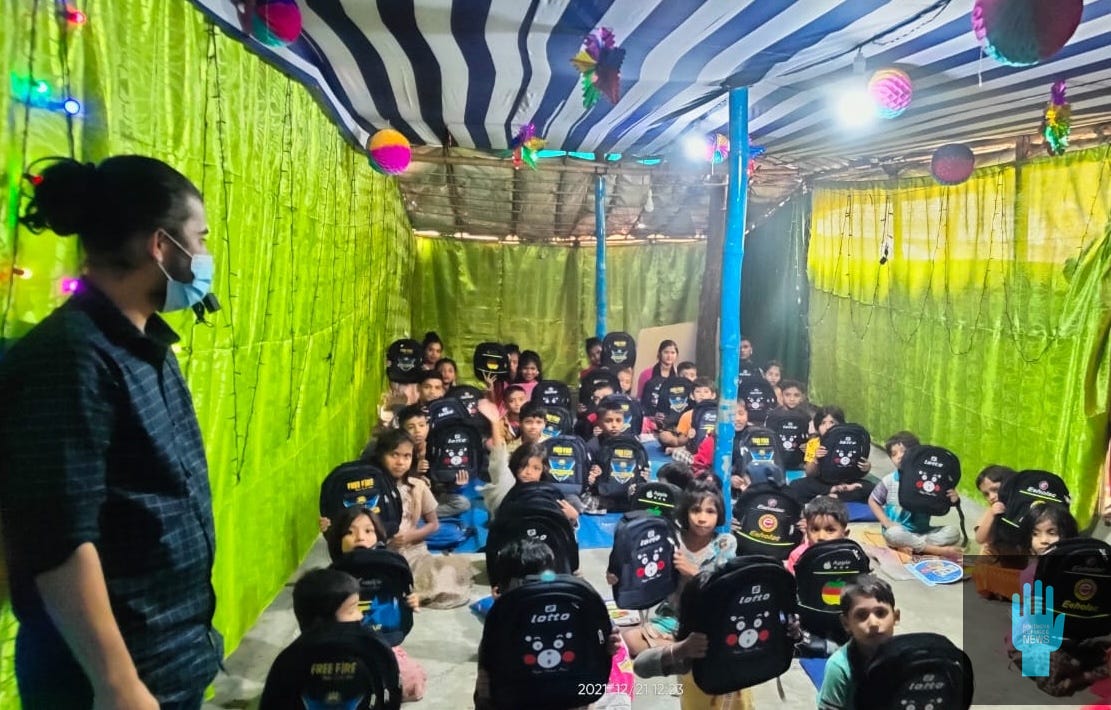A Christmas Within Barbed Wire: Christian Rohingya Refugees
The Overlooked Minority

In the sprawling refugee camps of Bangladesh, which have become a “temporary” sanctuary for the Rohingya, a predominantly Muslim ethnic group from Myanmar, there exists a small, often overlooked minority: the Christian Rohingya. In this article, we shift our focus to this community, exploring their preparations for upcoming Christmas celebrations in a setting that is far from the festive atmospheres typically associated with such occasions.
Basic Facts and Figures: A Community in the Shadows
Approximately 500 Christian Rohingya families, amounting to between 2000 and 2500 individuals, are scattered across the camps. The religious makeup of this community is predominantly Baptists and Pentecostals, with the latter forming the majority within the community. These families primarily reside in Camp 27 in Teknaf, various camps in Kutupalong, and the Transit Centre (TC), and they also have a small presence on Bhasan Char island. Their worship takes place in temporary structures, including a home church in Bhasan Char and makeshift churches within the TC and Camps 13 and 27.
As Christmas approaches, preparations in the camps are modest yet meaningful. Children read stories about the birth of Jesus Christ, and the community gathers for a cake-cutting celebration and a shared meal. Unlike commercialised festivities elsewhere, their Christmas is a simple, non-materialistic event, devoid of the typical exchange of presents. Peter Saiful, the Pastor of Bethel Church: Rohingya Christian Fellowship and a resident of the Transit Centre, provides insight into their spiritual resources. He explains, “We don't have a Bible in our language. The Bethel Church Rohingya Christian Fellowship began translating the Bible 12 years ago. The process is slow and hampered by lack of financial support, but some of us can read the Bible in English, obtained from the Bangladesh Bible Society and a library in Malumghat.”"
History of Marginalisation
The Christian Rohingya face a unique set of challenges, particularly in practicing their faith openly. They navigate a precarious existence where their faith intersects with broader social and political dynamics in the refugee camps. Intolerance and difficulties within the camps force some to conceal their beliefs, with a few even attending mosques to avoid suspicion.
Their community has also been subject to various accusations, as reported in accounts from within these communities. Allegations, primarily from groups and individuals associated with the Arakan Rohingya Salvation Army (ARSA) and conservative Muslim groups, suggest efforts to convert Muslims, backed by foreign missionary organisations, and even accusations of collusion with the Myanmar military. These claims, lacking evidence, have contributed to an atmosphere of mistrust and furthered the social segregation within the camps.

Since 2014, the Christian Rohingya families have faced a multitude of challenges including arbitrary arrests and extortion by the police, as well as violence and death threats primarily from criminal groups and certain factions within the Rohingya community itself.
In January 2020, Yanghee Lee, the former special rapporteur for Myanmar, made a significant visit to the small Christian Church in Kutupalong. Her observations, later published in her End of Mission Statement on the 23rd of January, were notably prescient. She highlighted the precarious situation of the Rohingya Christians, stating,
"I also met with a group of Rohingya Christians who are in a most difficult position. They told me they were persecuted due to their religion by the Myanmar Government while they lived in Rakhine, and now they face hostility and violence from a small number of other camp residents. This worries me.”
Only three days later, on 26 January, a grave incident occurred highlighting the vulnerability of the Christian Rohingya community. Taher, a Christian Rohingya pastor, and his 14-year-old daughter were abducted from their shelter, following a violent attack on Christian families in Kutupalong Camp 2. This assault involved scores of men who injured residents, vandalised homes, and looted property. Twelve individuals were hospitalised, and a makeshift Christian church and school were destroyedFollowing this, the affected families moved to the UNHCR Transit Centre.The destruction of their church in Kutupalong camp and the subsequent relocation to a so-called “safe zone” did little to alleviate their plight. Instead, it ushered in a life marked by increased isolation and restricted access to fundamental rights like health, education, and movement. These additional restrictions have only exacerbated their sense of fear and abandonment.

I spoke to Khatiza (cover image), a young Christian Rohingya woman residing in the TC. Her words poignantly capture the pain and hope of her community. Having spent her entire 17 years within the restrictive confines of a refugee camp, Khatiza describes her life as akin to an “open air prison.” This sense of confinement intensified after the camp authorities relocated her to the TC, her life becoming even more akin to that of a detention centre.
Khatiza's account vividly illustrates the complex challenges faced by the Christian Rohingya, who endure hardships not only as refugees but also as a religious minority. She speaks of living in conditions that make her feel dehumanised and neglected. At the same time, Khatiza's words also echo a spirit yearning for freedom and dignity.
Her wish for 2024 is heartfelt and inclusive:: “I prayed to God to open a way for all Rohingya, regardless of our faith, so that we can breathe air in a place where our rights as human beings are acknowledged and respected.” Khatiza's personal story, while unique, mirrors the collective aspirations of her community. Together, they yearn for a resolution to their prolonged ordeal, aspiring to a life of dignity beyond the confines of the barbed wire camps.
Finally…
As mentioned above, an initiative is underway to translate the Bible into the Rohingya language, addressing an aspiration within this community. This project aims to provide the Christian Rohingya with access to religious texts in their native language, something they feel that has been long overdue. For those who wish to support this meaningful cause, donations can be made to assist in the translation efforts HERE.


